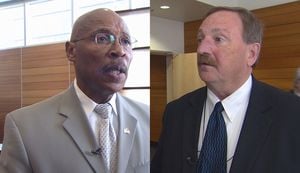Santiago Abascal, the leader of Spain’s nationalist Vox party, has taken on a significant new role as the chairman of the Patriots for Europe party. His appointment was confirmed during the party’s general assembly held recently in Paris, illustrating the increasing influence of right-wing movements throughout Europe and marking Abascal's rising stature on the international conservative scene.
Patriots for Europe serves as a coalition for various nationalist and right-wing parties from across the continent. The organization emphasizes traditional values, national sovereignty, and resistance against what its members perceive as excessive control by supranational entities like the European Union. The selection of Abascal for this position highlights the group's desire to unify nationalistic sentiment and provide consistent representation for conservative voters across Europe.
Abascal's political path has been characterized by his unwavering support for defined national identities, stricter immigration policies, and opposition to progressive globalist initiatives. Under his guidance, Vox has emerged as a major political force in Spain, effectively challenging the long-established dominance of Spain's traditional political factions and stimulating national discourse on nationalist themes.
The reach of Abascal’s influence spans beyond the borders of Spain, thanks to his initiatives to forge international alliances with like-minded leaders. His network includes prominent figures such as Italy’s Prime Minister Giorgia Meloni, Argentine president-elect Javier Milei, and Hungary’s Prime Minister Viktor Orbán, alongside former U.S. President Donald Trump. These connections portray his capacity to engage with leaders from different nations who share common conservative ideologies.
By capitalizing on these alliances, Abascal is positioned as a central character within a transnational movement. His role as chairman of Patriots for Europe cements his position as a unifying entity among Europe’s right-wing political factions.
Established to provide a distinct vision for European integration, Patriots for Europe prioritizes the sovereignty of individual nations above centralized governance. Its member parties advocate for more stringent immigration regulations, preservation of traditional cultural values, and economic reforms focused on national interests. With Abascal leading the charge, the party is expected to amplify its criticisms of EU policies, particularly concerning migration and regulatory matters. The group’s aim is to combat the perceived dilution of national identities and the imposition of uniform policies by institutions based in Brussels.
Abascal’s ascent coincides with broader trends of nationalist and populist parties gaining momentum across Europe. From Marine Le Pen’s National Rally in France to Poland’s Law and Justice Party, voters are increasingly supporting movements which vow to restore national pride and tackle concerns surrounding globalization, immigration, and cultural uniformity. Abascal embodies this contemporary political spirit well, as he effectively articulates the concerns of various demographics, ranging from rural conservatives to urban middle-class voters, which has propelled Vox's success within the European nationalist spectrum. Now, as chairman of Patriots for Europe, he has the opportunity to relay this message to broader audiences, encouraging collaboration among nationalist leaders.
Despite these achievements, Abascal is not without his challenges. The European political environment remains deeply split, and many nationalist parties struggle to bridge regional differences and develop unified positions. Detractors of Patriots for Europe argue its platform undermines ideals of European unity and inclusiveness.
Abascal’s leadership capabilities will be tested as he navigates these challenges, all the While sustaining the energy of the nationalist movement. His extensive experience suggests he is well-prepared for this endeavor. By promoting shared principles and presenting a cohesive vision for Europe’s future, he holds the potential to unite various political factions and create strong opposition to the mainstream political establishment.
On another front, Donald Trump’s anticipated return to the White House has taken center stage at recent European political gatherings, impacting national discussions around security, migration, and the future of EU competitiveness. While various sentiments swirl around Trump’s potential presidency, European leaders gathered for significant meetings— including nearly 50 heads of state—focused on issues affecting Ukraine, economic stability, and transatlantic relations.
Uncertainty characterized the discussions surrounding U.S. support for Ukraine against Russian aggressions, NATO's role, and potential trade tariffs impacting European exports. Amidst this volatile situation, the news of Germany's ruling coalition disintegrated, thrusting Chancellor Olaf Scholz’s government under scrutiny as they prepared for upcoming elections.
Concerns pertained to the summit plans laid out by Hungary’s Prime Minister Viktor Orbán, who still faces criticism from peers within the European Union for his political dealings with Moscow. Speculations arose, hinting at the possibility of summoning Trump via video link, sparking excitement for some and unease for others within the gathering.
The meeting participants addressed issues expected to shape future discussions including enhanced support for Ukraine, migration management, and measures for economic security, which reflect increasing scrutiny of foreign investments and coordinated responses to technology outflows affecting international relations, especially with rising tensions between the U.S. and China.
The agenda for the meeting held within Budapest also included discussions around Georgia’s recent elections, where the ruling Georgian Dream party has been perceived as leaning pro-Russian, resulting in the European Union freezing their membership application amid concerns about democracy.
EU leaders aimed to wrap up their discussions with unified compliments directed at Trump, emphasising the importance of maintaining solid U.S.-EU relations, simultaneously underlining the EU's intentions to uphold its distinct agenda on global trading rules.
Budapest’s meetings became particularly significant as EU leaders prepared to engage with pivotal topics tied to European competitiveness, underlining the importance of refining policies to bolster the EU's economic presence on the global stage. The conclusion of these gatherings remains forthcoming, but European officials expect fruitful discourse aimed at solidifying cooperative strategies and navigational paths as they adapt to changing political landscapes.
Meanwhile, within Spain, the centre-right opposition Partido Popular has firmly declared it will not endorse the European Commission of Ursula von der Leyen if the current Ecological Transition Minister, Teresa Ribera, remains part of the new lineup. This decision follows recent catastrophic flooding incidents in Valencia and Castilla la Mancha, claiming over two hundred lives, which the Partido Popular attributes to Ribera’s inadequate management abilities during the crisis.
Party spokeswoman Dolors Montserrat articulated their stance, asserting it is unfathomable for the PP to support any commission with Ribera included, referencing the tragic toll of the floods. Consequently, they have demanded accountability from the minister and suggested alternative candidacies for the new European commissioner position.
The friction between the Centro-Derecha and the ruling left coalition deepened as critics condemned the right-wing party for its actions, labelling them as unpatriotic. This political conflict has unfinished business looming over EU parliamentary discussions— the fate of Ribera and the upcoming commission lineup remains uncertain. The next few days will determine the level of support Ribera can garner and whether or not the newly proposed commission will take office by the beginning of December.
Overall, the shifts occurring throughout Europe, both politically and within parties like Patriots for Europe, encapsulate the swirling sentiments of nationalistic pride, varied responses to crises, and growing divisions within major political coalitions. Abascal's new role, coupled with Trump’s potential influence, positions them at the heart of debates shaping Europe’s political outlook as they navigate the challenges posed by the acceleration of right-wing ideologies, regional support for populist movements, and the demands to maintain cohesive and functional governance within the complex terrain of European politics.



